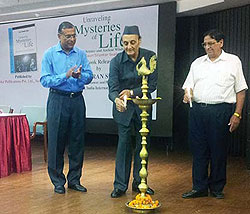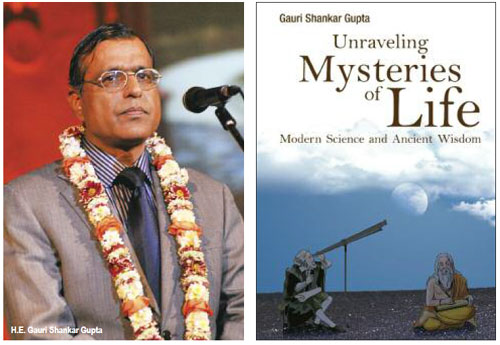|
You’ve deftly combined a diplomatic career with a passion for public discourse on the mysteries of life. Your latest book delves inward. When did this journey into the Inner World begin?
First of all, let me thank you profoundly for inviting me for this interview, and I’d also like to congratulate you in terms of various publications on India Diaspora that you’re coming up with. I greatly value the contribution you have made. So far as my journey and diplomatic life is concerned, I’ve done my diplomatic work in the best possible way. In the assignment I just concluded in Hungary, the Hungarian foreign minister has given me a wonderful letter appreciating my work. The Hungarian Government has written that they’d like to bestow the highest civilian award to me. Of course, the Government of India does not allow civil servants to receive awards but the very fact that Government of Hungary has expressed its desire of honouring me in writing, speaks for itself.
In an earlier assignment as ambassador of India to Mongolia I had done my best to take Indo-Mongolian relationships to a new height. I had given top priority to my work for which I am paid by the people of India and by the Government of India. The salaries and perks we cherish are the contributions of the poor people of India by way of taxes. I firmly believe that we should do justice to the job we are assigned in the best interests of the nation.
As regards the inner journey, the two things are not contradictory in any way. In fact inner journey helps you to do your job in a better way. I’ve been in introspection about my own self, the mission of life, the nature of this world, relations amongst humans and also relationship between nature and human.
This journey took a new dimension around 2008 when I was in Delhi. Since then I started reading more and more about Indian Vedic writing, listened to various discourses on TV and on the internet and personally developed a sort of interest in this field which culminated and came into limelight while I was in Hungary. A lot of cultural centres invited me and when I delivered my talks they appreciated. Very profound questions were asked, and therefore I decided to write a book on the subject. It was published in September 2012 in Budapest and subsequently a Hungarian edition was brought out. Now it has been launched in India. Now I feel that the inner journey is helping me to further refine my way of life at a personal, official and social level.

Dr Karan Singh, intellectual stalwart and President of the Indian Council for Cultural Relations (ICCR) was the chief guest at the function for launching H.E. Gupta’s book |
“Yes, one tries to learn about various civilizations, the wisdom left behind by ancestors. In India, of course, we’ve the Vedas. There are similar old writings in Greek and Babylonian civilizations and in the Mayan world. I’ve not gone into the details of these civilizations and their heritage. It is not possible for one man to do so in one lifetime. It requires decades, even centuries, perhaps lifetimes. I would like to do some work on Chinese and Egyptian writings. The quest is always there” |
Please throw some light on your book “Unraveling Mysteries of Life—Modern Science and Ancient Wisdom”…
It consists primarily of two important sections at macro and micro levels. The macro deals with the origin of the Universe, the function of the Universe, Cosmic energy, human health, the idea of development and issues similar to growth and nature. The micro deals with the individual human being, the constitution of the human being. There is a chapter called Who Am I. It deals with human desires, nature of human functioning, functioning of this world and how we remain entangled in it. It talks about the final purpose of human life and why we are born. I can’t say I’ve given all answers but I have tried to give answers to questions which a very large number of people have been asking.
You have travelled to nearly 80 countries, we read in an interview. Do you fascinate about the ancient wisdom of these places?
Yes, one tries to learn about various civilizations, the wisdom left behind by ancestors. In India, of course, we’ve the Vedas. There are similar old writings in Greek and Babylonian civilizations and in the Mayan world. I’ve not gone into the details of these civilizations and their heritage. It is not possible for one man to do so in one lifetime. It requires decades, even centuries, perhaps lifetimes. I would like to do some work on Chinese and Egyptian writings. The quest is always there. While in Mongolia I developed a fascination for the nomadic life. I also developed a fascination for ancient Buddhist culture. While in Bahrain, I travelled to Egypt, Saudi Arabia and Iraq to find out something about Islamic traditions. But those were not very profound. I need to do much more work on them to understand them fully.

You are India’s next high commissioner in Trinidad and Tobago, a country that has a majority Indian origin population that is deeply interested in keeping connected to its ancestral land and to its roots. Your Spiritual bent of mind is definitely going to be very welcome in Port of Spain and a big positive for a posting like this…
I’m indeed excited about this posting. I will do my best to promote our relations with those whose ancestors migrated from India and try to bring them closer to India. We have much to learn from them, and they have similarly something to learn from us. It is indeed fascinating that these people who migrated almost 200 years ago are able to preserve Indian tradition, culture, practices and festivals in a far-off place, completely dominated by different cultures. We must pay tribute to these people who have preserved the values of their motherland.
You mention in one of your interviews that the one job you’d never want is that of a butcher. On a philosophical note, kindly explain why so and why personally you’d stay away from it…
You are right. It is associated with my belief. I believe in non-violence, in ahimsa. I believe in love not in hatred, I don’t believe in killing lives unless imperative for self survival that is in-principal enshrined in our civilization. That is why willingly I would not like to kill any animal, and any life in any other form. It is not just painful for me, but for entire humanity. Western world is also now recognizing how animals are being reared only to be killed. Imagine a race higher than humans, rearing humans to kill them. We should take a prudent and rational view on the issue of whether killing animals is desirable or not. This a question to which each civilization has to find an answer to. This is my belief. But since it is an open question, there are lot of people who do not agree with me. They have their right, I don’t question them. But I wish to express my views.
What advice do you have for upcoming IFS officers?
The international environment has undergone tremendous change and the world has been reduced to a global village. Barriers of borders are disappearing. In this kind of a scenario, work is more and more challenging. There are newer kinds of problems that require immediate attention and one cannot wait for weeks or months to address those. Media is very vibrant and they pick up matters quicker than diplomats do. So you have to be very active. We faced this challenge, but were able to deal with it in a more relaxed manner. But the next generation has to face it more. At the same time diplomats will have to work very hard to ensure that wards do not take place, that peace is the basis for firmly establishing relations, international issues are resolved through negotiations, the means being made to do so are better. This is the kind of nature of diplomacy we have to face and will continue to face. India has emerged as an important player both in terms of economic development and political weightage. All this gives a greater role to Indian diplomats of the future. When I joined the diplomatic service India was seen in a different perspective. Our challenges will be a lot more in coming years.
|